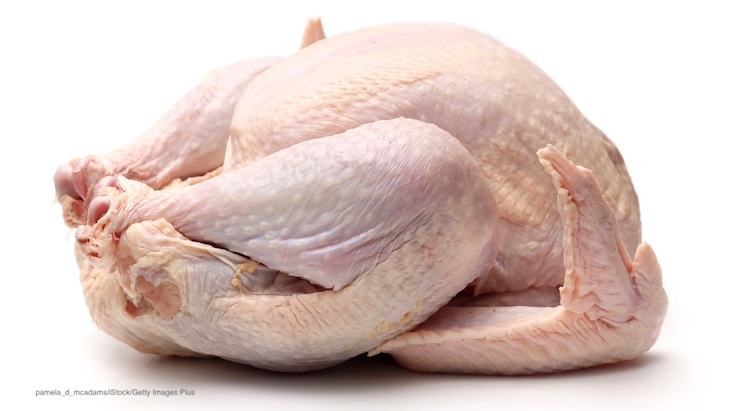The Centers for Diseases Control and Prevention (CDC) is reiterating advice it has given before: don’t rinse that chicken! Americans eat more chicken than any other meat, and chicken is often contaminated with Campylobacter, Salmonella, and Clostridum perfringens bacteria. Anyone who purchases raw chicken should handle it carefully to prevent food poisoning.

Cooks and even cookbooks have told consumers to rinse chicken before cooking. But that advice is incorrect; don’t rinse that chicken! Bacteria can aerosolize under running water, and can contaminate everything within a 3-foot radius of the faucet. That means that the sink, countertop, and even you can be contaminated with pathogens if you rinse your chicken. The only thing that gets rid of bacteria on chicken is cooking it to 165°F as measured by a reliable food thermometer.
Other steps to take start at the grocery store: place chicken in a disposable bag before putting it in your shopping cart. (Editor’s note: I reach into the bag and grasp the chicken; turn the bag inside out with the chicken inside so you don’t contaminate your hands.) In addition, use a separate cutting board for raw chicken. Wash your hands with warm soapy water for 20 seconds before and after handling raw chicken. And always use a fresh, clean plate to hold cooked chicken; never put cooked food on any surface that previously held raw chicken.
Frozen raw breaded chicken is a special case. that product can look cooked, but it usually sold raw. Never microwave this product, since the microwave can leave cold spots where bacteria can survive. If raw chicken is included in a microwaveable meal, follow cooking directions carefully.
If you are eating at a restaurant and any poultry dish does not appear fully cooked, send it back for more cooking. Don’t worry about offending the server or chef.
And finally, always refrigerate leftover chicken dishes within 2 hours, or 1 hour if the ambient temperature is above 90°F. Place the food in a shallow container so it cools down more quickly.




